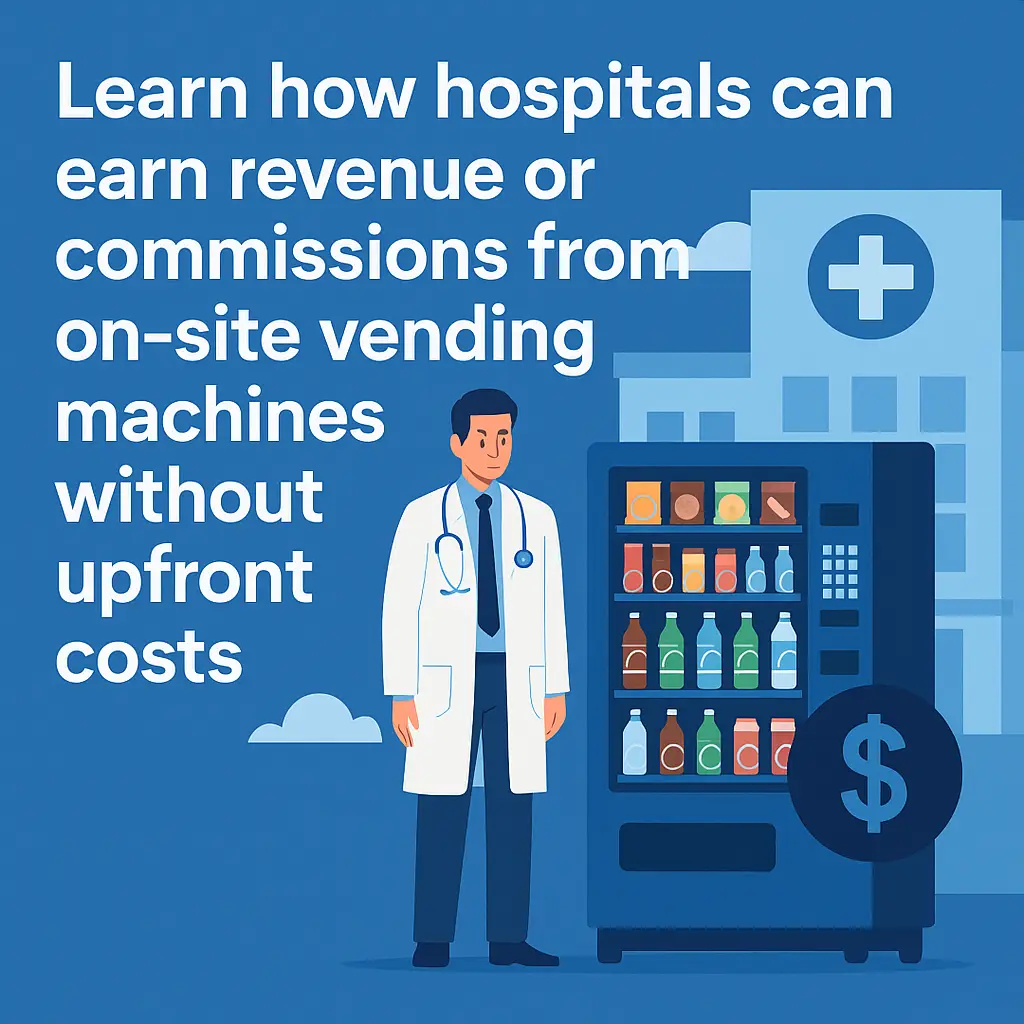Generating Revenue from Hospital Vending Programs
Learn how hospitals can earn revenue or commissions from on-site vending machines without upfront costs.
Back to Vending for Healthcare ResourcesLearn how hospitals can earn revenue or commissions from on-site vending machines without upfront costs.
Back to Vending for Healthcare ResourcesHospitals typically earn commissions from sales or receive a share of revenue generated by vending machines placed on-site.
![]() Strict sanitation standards protect patient health and safety
Strict sanitation standards protect patient health and safety
![]() Compliance ensures alignment with hospital regulations
Compliance ensures alignment with hospital regulations
![]() Routine inspections reduce expired and unsafe products
Routine inspections reduce expired and unsafe products

Hospitals face constant financial pressures, making it important to identify opportunities that generate extra revenue without adding administrative burdens. One proven method is implementing on-site vending programs. These programs not only provide staff, patients, and visitors with convenient access to food and drinks, but also create a passive income stream for the hospital itself.
The most common way hospitals benefit is through commission-based programs. In this setup, the hospital earns a percentage of sales from each machine placed on the property. Commissions vary depending on product selection, traffic levels, and machine type, but they typically provide steady supplemental income that can support hospital services or facility improvements.
Another advantage is the lack of financial risk. Equipment, delivery, and installation are provided without cost to the hospital. This allows healthcare facilities to enjoy an additional revenue source without having to budget for expensive machines or maintenance. This structure makes vending programs especially attractive for administrators looking for simple, low-cost revenue solutions.
Hospitals can choose from different machine types to maximize earnings. Options include combo machines that provide snacks and beverages, glass-front units with high product visibility, micro markets for fresh items, and AI-powered coolers with advanced features. Selection should be based on available space, expected traffic, and demand for healthy or specialty products. Matching the right vending format with hospital needs helps ensure consistent sales.
Hospitals already manage complex operations, so vending programs are designed to be hands-off. Machines are stocked and serviced externally, eliminating staff involvement. The hospitalâs role is simply to provide space and collect revenue. For more insights into specialized vending models, explore resources on the differences between micro markets and vending machines or learn about meeting sanitation and compliance standards.
If you're exploring vending options for your business, Vending Exchange can help simplify the process. Delivery, Installation and Equipment is provided at no cost to you - vendors provide the machines, keep them stocked, and handle all servicing. Whether you need a provider or full-service management, just fill out the form on this page to get started.
Hospitals typically earn a commission on sales, which provides ongoing passive income.
No, installation, equipment, and delivery are provided without cost to hospitals.
Revenue depends on traffic, product selection, and machine type, with commissions varying accordingly.
No, machines are serviced, stocked, and maintained externally with no hospital staff involvement.
Micro markets and AI coolers often generate higher sales due to fresh and varied product offerings.
Yes, machine types, product mixes, and layouts can be tailored to available space and staff demand.
Yes, vending typically provides consistent supplemental income, especially in high-traffic hospital areas.
Yes, many programs offer healthier snacks, beverages, and fresh food options aligned with wellness goals.
No, compact combo machines work well in smaller areas, while larger spaces can support micro markets.
Programs adhere to sanitation and regulatory requirements, ensuring safe and compliant food service.